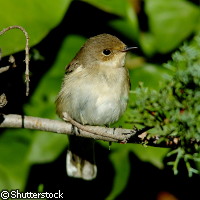Bad weather plays havoc with flycatcher's travel plans
Despite claims that migratory birds are adapting poorly to climate change because of their rigid adherence to the timing of their migration, European scientists have discovered that the pied flycatcher is coping relatively well. The species demonstrates a willingness to set off on migration earlier, which signals great potential for long-term adaptability. The scientists note, however, that the birds may be experiencing delays on the final leg of their journey as they encounter difficult weather conditions. The study's results are published in Current Biology. The pied flycatcher (Ficedula hypoleuca) is one of the most commonly studied species of migratory birds. Documentation on this species dates back 50 years providing scientists with the foundation to examine its evolution, particularly with regard to the effect that climate change may be having on breeding patterns. As a forest-dwelling bird, the pied flycatcher also provides insight into changes taking place in relation to food and the different seasons in that environment. Co-author of the study Dr Christiaan Both of the University of Groningen in the Netherlands explained that forests are characterised by an influx of insects early in the spring. 'If the birds miss this insect peak for raising their chicks, they do not produce enough offspring to keep up their population sizes,' he said. During the spring migration period, pied flycatchers must travel anywhere between 5,000 and 9,000 kilometres from their winter dwellings in west Africa to reach their breeding grounds in different countries in Europe and parts of Siberia in Russia. As part of their study, the scientists concluded that the birds took six days to travel from northern Africa to the Netherlands, and a further six days to reach central Sweden. Only a small fraction of the birds actually survive the gruelling journey. The team observed that in 2002, the birds set off for migration and reached northern Africa 10 days earlier than they had done in 1980. Despite the early start, the scientists discovered that the birds did not reach their breeding grounds any sooner than their counterparts had 20 years ago. This travel delay suggests that their trek through Europe was fraught with harsh environmental conditions. Dr Both pointed out that the birds are responding to climate change by being more flexible on when they set off for migration. He added that the response to climate change is less direct in nature; for example, the birds are progressively breeding earlier, resulting in newborns earlier in the spring. 'We have been claiming for a while that migratory birds have difficulties in adapting to climate change because of their rigid and rather inflexible timing of spring migration,' Dr Both said. 'We now show that the effect of early birth is also that the birds migrate early, and migration time has advanced over the last 25 years. The reason that the birds did not advance their arrival is thus not due to a failure to start migration earlier, but because circumstances at passage in southern Europe have not improved.'
Countries
Netherlands



